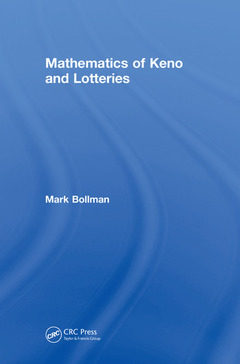Description
Mathematics of Keno and Lotteries
AK Peters/CRC Recreational Mathematics Series
Author: Bollman Mark
Language: English
Subjects for Mathematics of Keno and Lotteries:
Keywords
Winning Number; elementary probability; Pay Table; conditional probability; Lottery Tickets; random strategies investments; HA; house advantage; Louisiana Lottery; Bet Slip; State Lotteries; Binomial Random Variable; Numbers Game; Foxwoods Casino; Sample Space; Raffle Drawing; Random Variable; SLS; Fcp; Chinese Lottery; Quick Pick; Binomial Experiment; Spanish Language Television Stations; California Club; Fact; Treasury Balance; Homing Pigeons; Jackpot; Ping Pong Balls
Publication date: 03-2018
· 15.6x23.4 cm · Hardback
Publication date: 03-2018
· 15.6x23.4 cm · Paperback
Description
/li>Contents
/li>Biography
/li>
Mathematics of Keno and Lotteries is an elementary treatment of the mathematics, primarily probability and simple combinatorics, involved in lotteries and keno. Keno has a long history as a high-advantage, high-payoff casino game, and state lottery games such as Powerball are mathematically similar. MKL also considers such lottery games as passive tickets, daily number drawings, and specialized games offered around the world. In addition, there is a section on financial mathematics that explains the connection between lump-sum lottery prizes (as with Powerball) and their multi-year annuity options. So-called "winning systems" for keno and lotteries are examined mathematically and their flaws identified.
Chapter 1. Historical Background. 1.1 History of. 1.2 History of Lotteries. Chapter 2. Mathematical Foundations. 2.1 Elementary Probability. 2.2 Addition Rules. 2.3 Conditional Probability. 2.4 Random Variables and Expected Value. 2.5 Combinatorics. 2.6 Binomial Distribution. Chapter 3. Keno. 3.1 Standard Keno Wagers. 3.2 Game Variations. 3.3 The Big Picture. 3.4 Video Keno. 3.5 Keno Side Bets. 3.6 Keno Strategies: Do They Work?. Chapter 4. Lotteries. 4.2 Passive Lottery Tickets. 4.3 Lotto Games. 4.4 Games Where Order Matters. 4.5 Powerball. 4.6 Lotto Strategies: Do They Work?
Mark Bollman is Professor of Mathematics and chair of the Department of Mathematics & Computer Science at Albion College in Albion, Michigan, and has taught 111 different courses in his career. Among these courses is "Mathematics of the Gaming Industry," where mathematics majors carefully study the math behind games of chance and travel to Las Vegas, Nevada, in order to compare theory and practice. He has also taken those ideas into Albion's Honors Program in "Great Issues in Humanities: Perspectives on Gambling," which considers gambling from literary, philosophical, and historical points of view as well as mathematically. Mark’s previous book is Basic Gambling Mathematics: The Numbers behind The Neon.




